 Image 1 of 12
Image 1 of 12

 Image 2 of 12
Image 2 of 12

 Image 3 of 12
Image 3 of 12

 Image 4 of 12
Image 4 of 12

 Image 5 of 12
Image 5 of 12

 Image 6 of 12
Image 6 of 12

 Image 7 of 12
Image 7 of 12

 Image 8 of 12
Image 8 of 12

 Image 9 of 12
Image 9 of 12

 Image 10 of 12
Image 10 of 12

 Image 11 of 12
Image 11 of 12

 Image 12 of 12
Image 12 of 12













Ender's Game Research Project and Speech Materials for High School
Promote student choice and facilitate the process of researching relevant topics from beginning to end with this low-prep activity to conclude a unit on Ender's Game by Orson Scott Card. Students will choose from thirty research topics—addressing ideas such as real-life child soldiers, humanitarian organizations, Project Blue Book, the Fermi paradox, space travel, and other events transpiring as recently as 2023—and navigate academically appropriate sources with the goal of teaching their peers about their topics. A detailed scoring rubric is provided. Materials are delivered in Word Document and PDF formats. (Alternatively, a Google Drive option is available.) Ultimately, students will perform the following tasks:
Articulate connections between a research topic and the assigned novel
Conduct research using available resources
Collect and classify reliable sources
Develop successful methods of recording information
Evaluate the credibility of nonfiction texts, taking into consideration readability, date, relevance, expertise, and bias
Apply conventions of MLA formatting
Correctly site resources to avoid plagiarism
Organize information in a cohesive manner, using a note-taking system that includes summary, paraphrasing, and quoted material
Analyze, synthesize, and integrate information, generating a thoughtfully comprehensive report, free of generalities and redundancies
Present information in a formal, coherent manner
Additional resources for teaching science fiction are available:
Promote student choice and facilitate the process of researching relevant topics from beginning to end with this low-prep activity to conclude a unit on Ender's Game by Orson Scott Card. Students will choose from thirty research topics—addressing ideas such as real-life child soldiers, humanitarian organizations, Project Blue Book, the Fermi paradox, space travel, and other events transpiring as recently as 2023—and navigate academically appropriate sources with the goal of teaching their peers about their topics. A detailed scoring rubric is provided. Materials are delivered in Word Document and PDF formats. (Alternatively, a Google Drive option is available.) Ultimately, students will perform the following tasks:
Articulate connections between a research topic and the assigned novel
Conduct research using available resources
Collect and classify reliable sources
Develop successful methods of recording information
Evaluate the credibility of nonfiction texts, taking into consideration readability, date, relevance, expertise, and bias
Apply conventions of MLA formatting
Correctly site resources to avoid plagiarism
Organize information in a cohesive manner, using a note-taking system that includes summary, paraphrasing, and quoted material
Analyze, synthesize, and integrate information, generating a thoughtfully comprehensive report, free of generalities and redundancies
Present information in a formal, coherent manner
Additional resources for teaching science fiction are available:
Promote student choice and facilitate the process of researching relevant topics from beginning to end with this low-prep activity to conclude a unit on Ender's Game by Orson Scott Card. Students will choose from thirty research topics—addressing ideas such as real-life child soldiers, humanitarian organizations, Project Blue Book, the Fermi paradox, space travel, and other events transpiring as recently as 2023—and navigate academically appropriate sources with the goal of teaching their peers about their topics. A detailed scoring rubric is provided. Materials are delivered in Word Document and PDF formats. (Alternatively, a Google Drive option is available.) Ultimately, students will perform the following tasks:
Articulate connections between a research topic and the assigned novel
Conduct research using available resources
Collect and classify reliable sources
Develop successful methods of recording information
Evaluate the credibility of nonfiction texts, taking into consideration readability, date, relevance, expertise, and bias
Apply conventions of MLA formatting
Correctly site resources to avoid plagiarism
Organize information in a cohesive manner, using a note-taking system that includes summary, paraphrasing, and quoted material
Analyze, synthesize, and integrate information, generating a thoughtfully comprehensive report, free of generalities and redundancies
Present information in a formal, coherent manner
Additional resources for teaching science fiction are available:
Preview this resource:
Promote student choice and facilitate the process of researching relevant topics from beginning to end with this low-prep activity to conclude a unit on Ender's Game by Orson Scott Card. Students will choose from thirty research topics—addressing ideas such as real-life child soldiers, humanitarian organizations, Project Blue Book, the Fermi paradox, space travel, and other events transpiring as recently as 2023—and navigate academically appropriate sources with the goal of teaching their peers about their topics.


